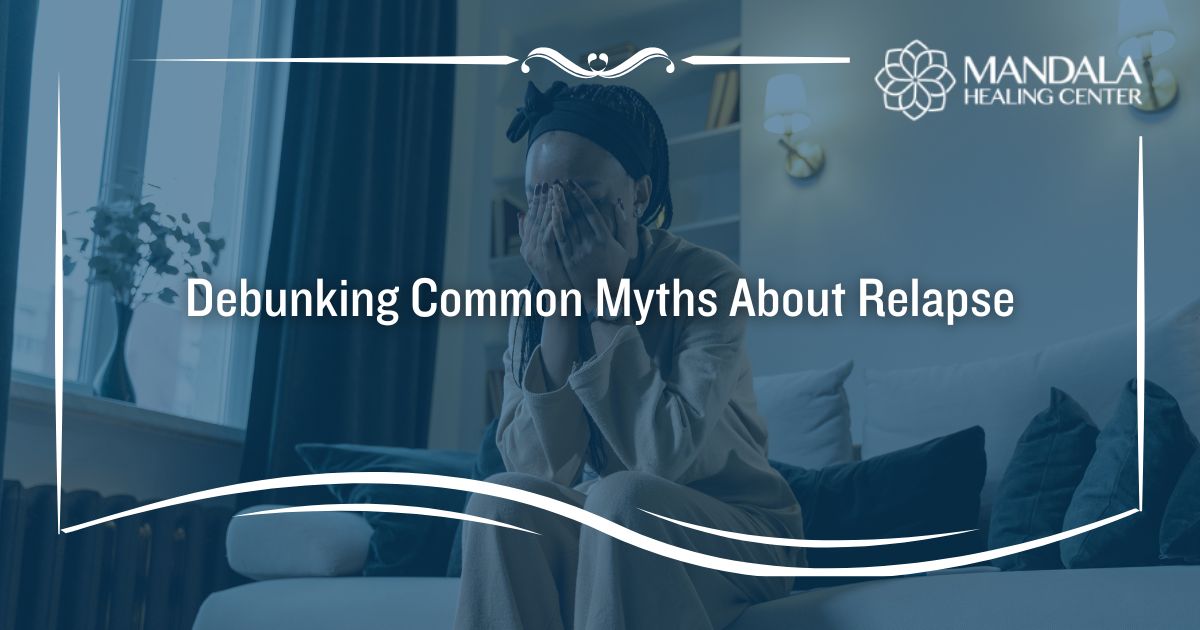If you are struggling with addiction, you are not alone. According to the Substance Abuse and Mental Health Services Administration (SAMHSA), 48.5 million people suffered from a substance use disorder in 2023.[1]
Addiction is a disease that affects every area of your life, from your physical and mental health to your social life and finances. Alcohol and drug addiction are chronic, and sometimes people experience relapses. While relapses are common, they do not indicate that you’ve failed.
There are plenty of myths about addiction relapse, including that everyone experiences them, that a relapse indicates failure, that they occur randomly, and there is no way to prevent them. Understanding why these misconceptions are false will help you gain the knowledge you need to avoid relapses in the future.
In this article, you will learn:
- What addiction relapse is
- Why relapse is common
- The truth about misconceptions associated with relapse
What are the Common Myths About Addiction Relapse?
Relapse occurs when someone in recovery from drug and alcohol addiction slips up and abuses a substance. The addiction relapse rate is 40 to 60%, which means it’s pretty common.[2] This is because there are triggers everywhere, including arguments with loved ones, experiencing stress, and seeing drug and alcohol use in person.
Despite how common relapse is, there are plenty of misconceptions about it. Let’s take a look at the most common myths about relapse and the truth behind them.
1. Everyone in Recovery Relapses
While relapse is common, it does not have to be a part of your story. You might hear someone say that you will relapse eventually, but this is not true for everyone. If you pay attention during addiction treatment, stick to your relapse prevention plan, and lean on your support system during times of need, you can avoid relapses.
Overcoming addiction is not easy, but if you use your coping skills and stay vigilant when it comes to triggers, you can maintain long-term sobriety without slipping up.
2. Relapse is a Failure
Some people say that relapse means you have failed or you have a lack of willpower that caused you to return to substance abuse. However, this is far from the truth. Most of the time, relapses occur because you experienced something that triggered you and you did not have the support you needed.
If you relapse, you should avoid looking at it as a failure. This can make it harder for you to return to sobriety, as feelings of guilt and shame further the cycle of addiction. Instead, look at it as a learning experience and double down on your recovery maintenance techniques.
3. It’s Only Relapse if You Use Your Drug of Choice
Some people think that relapse only counts if you use your drug of choice or the substance that you were addicted to. However, it is possible to experience a relapse using a drug you’ve never tried before. For example, if you recovered from heroin addiction and began abusing prescription drugs like Adderall, you are experiencing a relapse.
4. Relapse Happens Out of the Blue
Another myth people believe about relapse is that it happens randomly. While it can feel sudden, relapse actually occurs in stages. The stages of relapse include emotional, mental, and physical relapse.
Emotional relapse is characterized by poor self-care, experiencing frequent negative emotions, and engaging in negative behavioral patterns. You probably won’t even be thinking about substance abuse at this stage.
Mental relapse occurs when part of you wants to abuse drugs and alcohol and the other wants to stay sober. You might be attending fewer recovery meetings, not using your coping mechanisms, and isolating from friends and family. It is also common to only remember the positive parts of substance abuse instead of remembering how it ruined your life.
Lastly, physical relapse is when you use substances. It can be a one-time slip or a long-term relapse.
Because relapse occurs in stages, it is possible to prevent yourself from engaging in substance abuse by using your recovery maintenance tools when you notice the signs of an emotional or mental relapse.
5. Taking Prescription Medication is a Relapse
Lastly, some people believe that taking prescription medication is always a relapse. This is a very harmful misconception that can prevent you from getting the help you need for mental health issues. Sometimes, prescription medication is necessary to help you manage symptoms and live a happy, healthy life.
As long as you are not abusing your prescription medications or using them to get high, you are not experiencing a relapse. It is always okay to take daily medications that you need to manage mental or physical health conditions.
Get Connected to a Top-Rated Drug and Alcohol Rehab Center
If you or a loved one suffers from addiction, it’s time to seek help from a professional recovery program. At the Mandala Healing Center, we can provide you with the tools and support you need to achieve long-term recovery and avoid relapse.
Contact us today for more information on our West Palm Beach addiction treatment center.
References:
- The Substance Abuse and Mental Health Services Administration (SAMHSA): Highlights for the 2023 National Survey on Drug Use and Health
- The National Institute on Drug Abuse (NIDA): Treatment and Recovery
















